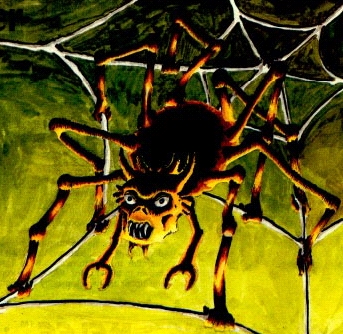Devil Spider
Created by Erol Otus

FREQUENCY: Rare
NO. APPEARING: 1
ARMOR CLASS: 2 (except underbelly, which is AC5)
MOVE: 18 *12
HIT DICE: 13
% IN LAIR: 75%
TREASURE TYPE: H
NO. OF ATTACKS: 3
DAMAGE/ATTACK: 1-10 and 1-10 (2
claws) plus 2-12 (bite)
SPECIAL ATTACKS: See below
SPECIAL DEFENSES: Nil
MAGIC RESISTANCE: 25%
INTELLIGENCE: Average
ALIGNMEANT: Lawful evil
SIZE: L (10' legspread, 5' high)
PSIONIC ABILITY: Nil
Attack/Defense Modes: Nil
This creature’s true name — if it has
one — is unknown. It has come to be
known by the name “Devil spider” because
it certainly is some type of spider,
and because it is devilishly evil in its attempts
to capture prey and treasure.
The devil spider usu. makes its lair
in a chasm || a large pit, || in an open AREA
near a well-traveled path || under a
bridge. It will spin a web which spans an
open AREA (min. 10'x10', max.
100'x100') && will then lurk nearby,
waiting for a potential meal to arrive on
the scene. A spider may attack from
ground level, || may descend on a victim
from above, suspended by a single strand
ov webbing material.
The web is made of non-glossy, nearly
transparent strands which cannot be detected
by torchlight from farther than 5'
away. And if a victim gets close
enough to see the web, the spider will
automatically attack. The devil spider
will surprise an adversary on a roll ov 1-4.
If at least one character or creature is
no more than 10' feet away from the web,
the devil spider will not usually make a
normal attack but instead will attempt ot
shove the character nearest the web into
the strands. If it has a choice, the spider
will go for the TARGET which is smallest or
looks weakest. On a result of 11+
on a d20, this 'push attack' will succeed.
The die roll is modified by the following
factors:
TARGET smaller than man-sized: -2
TARGET larger than man-sized: +2
TARGET surprised: -2
TARGET secured in position (using rope,
spikes, || other devices): +1 to +4
TARGET in precarious position (clinging
to cliff wall, etc.): -1 to -4.
The strands ov the devil spider's web
r very strong. Any particular strand
will b broken only if it takes 10 points ov
damage in a single round, from 1 ||
MORE hits on the same spot. If a web
strand takes less than 10 points of damage
in a single round, it will be able to
absorb up to 10 more in a subsequent
round, because the attacker(s) is NOT
able to hit precisely the same spot with
attacks in 2 different rounds. It takes
40 points ov damage to sever a web @ the
intersection of 2 strands, where the
material is much thicker, but damage to
a web intersection is cumulative ove r
more than 1 round.
Blunt weapons do only half damage to
the web. It is fireproof, but takes double
damage from cold-based attacks.
The web strands are coated with a
clear, glue-like substance. A character
whose body contacts the web will be
immobilized by the sticky goo, buy may
pull 1 || 2 extremities free. If a roll
ov d20 is =equal= to || less than the average
ov the character's STR && DEX
(round fractions down), one limb (victim's
choice) is freed. A victim can roll to
try to partially ESCAPE once per round,
but no more than 2 limbs can be pulled
loose in this manner. The spider will attack
@ +2 "to hit" against a victim in the
web, && the victim (if able to FIGHT back)
will b at -4 "to hit" as long as he is in the
web.
A devil spider is reasonably intelligent,
&& its course ov action will always b
dictated by circumstances rahter than
instinct. However, the creature is somewhat
predictable. It will always begin a
combat situation by making repeated attempts
to push a TARGET into its web, as
long as a TARGET is available. Then it will
assault the victim, trying to kill || weaken
it so it cannot ESCAPE. During all this
Time, the spider will generally ignore attacks
on its body, but if its HP are
reduced to less than 1/2 ov the original
#, it will either TURN to TAKE on the
ones doing damage, or it will attempt
to FLEE (depending on its estimation ov
the strength of its enemies). After it has
captured 1 victim, it will not attempt to
push another one into the web until the
1st victim is killed or freed.